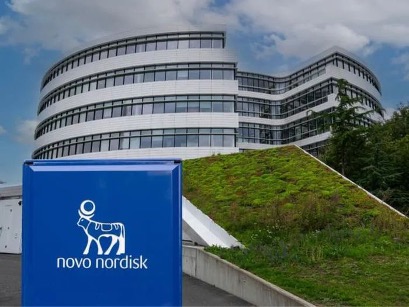Collaborating with 10 Indian AI startups
October 16, 2024
Source: drugdu
 303
303
 These measures are part of the business expansion plan launched by this Danish pharmaceutical company in Bangalore 17 years ago. The center helps manage a large amount of data collected regarding the safety and efficacy of its drugs, including clinical trial information and potential side effect reports. One of the factors driving this initiative is that the demand for obesity and diabetes related drugs is expected to grow, especially with the increasing global attention to these health problems. Through strategic positioning in India (one of the world's largest diabetes drug markets), Novo Nordisk is expected to meet the growing demand by improving its production capacity.
These measures are part of the business expansion plan launched by this Danish pharmaceutical company in Bangalore 17 years ago. The center helps manage a large amount of data collected regarding the safety and efficacy of its drugs, including clinical trial information and potential side effect reports. One of the factors driving this initiative is that the demand for obesity and diabetes related drugs is expected to grow, especially with the increasing global attention to these health problems. Through strategic positioning in India (one of the world's largest diabetes drug markets), Novo Nordisk is expected to meet the growing demand by improving its production capacity.
This partnership has also had a broader impact on the operations of Novo Nordisk. It is expected that Novo Nordisk's Bangalore center will become an approximate mirror of its Danish headquarters within three years. The company plans to increase the number of employees in Bangalore by 16% to 5000; And increase the number of global process leaders. It is evident that Novo Nordisk sees India as a partner and an important component of its future strategy.
John Dawber, General Manager of Global Business Services at Novo Nordisk, highlighted the revolutionary process of AI tools developed by these 10 startups. These processes include document summarization, insight extraction, and error detection. The results are impressive, as AI driven quality checks save time on regulatory document review, reducing the time from 40 hours to just 40 minutes. This is just the beginning, and Novo Nordisk's willingness to collaborate with more AI startups in India highlights the talent and innovation capabilities that India offers.
India's artificial intelligence ecosystem is rapidly maturing, driven by investment and creativity. From 2019 to 2024 (so far), more than 100 AI startups have raised over $600 million in funding. The industry will achieve greater breakthroughs. Krutrim and SarvamAI, among other startups, are exemplary technology companies in the field of artificial intelligence in India.
This measure is not only beneficial for Novo Nordisk, but also in line with broader trends in the pharmaceutical industry. Competitors are starting to pay attention to India's role as an emerging center for drug development and manufacturing. Other global pharmaceutical companies are also increasing their influence and investments, indicating that India is becoming an indispensable part of the global healthcare supply chain.
Novo Nordisk's uniqueness lies in its dual focus strategy: investing in human capital while advancing technology. They believe that this balanced approach can not only accelerate the drug development process, but also help them maintain competitiveness as global pharmaceutical companies are also increasing their business in India to tap into their vast market.
Nord Nord Wegovy and its competitors Eli Lilly's Mounjaro and Zepbound belong to the GLP-1 receptor agonist class of drugs, which help control blood sugar and slow down digestion, thereby prolonging satiety. Novo Nordisk and Eli Lilly plan to launch these drugs in India, and analysts predict that the global weight loss drug market may reach a size of $150 billion in the next decade.
On October 2nd, the FDA announced that the shortage of Eli Lilly Zepbound has been resolved after nearly two years. This means that the composite pharmacy must stop producing imitations of these drugs, which is only allowed in cases of official shortage. However, the FDA's decision has sparked dissatisfaction from the outsourcing facility association, a trade group representing the interests of large pharmacies. On October 7th, the association filed a lawsuit against the FDA in federal court, claiming that its "reckless and arbitrary" decision to remove tilpotide from the official shortage list ignored evidence that the drug was still in short supply, deprived patients of treatment opportunities, and increased drug prices.
Summary
More and more companies are utilizing AI to improve various operational aspects from research and development to marketing and distribution. For Novo Nordisk, the potential of AI in assisting with regulatory document checks is particularly valuable, as it can greatly reduce the time and effort required to navigate complex compliance environments. Earlier this year, French pharmaceutical company Sanofi announced plans to invest $437 million in its India center. Bristol Myers Squibb has confirmed that the company hopes to strengthen drug development through the use of artificial intelligence and digital technology, and expects its factory in Hyderabad, India to become its largest outside the United States by 2025.
Source: https://pharm.jgvogel.cn/c1451000.shtml
By editorRead more on
- The first subject has been dosed in the Phase I clinical trial of Yuandong Bio’s EP-0210 monoclonal antibody injection. February 10, 2026
- Clinical trial of recombinant herpes zoster ZFA01 adjuvant vaccine (CHO cells) approved February 10, 2026
- Heyu Pharmaceuticals’ FGFR4 inhibitor ipagoglottinib has received Fast Track designation from the FDA for the treatment of advanced HCC patients with FGF19 overexpression who have been treated with ICIs and mTKIs. February 10, 2026
- Sanofi’s “Rilzabrutinib” has been recognized as a Breakthrough Therapy in the United States and an Orphan Drug in Japan, and has applied for marketing approval in China. February 10, 2026
- Domestically developed blockbuster ADC approved for new indication February 10, 2026
your submission has already been received.
OK
Subscribe
Please enter a valid Email address!
Submit
The most relevant industry news & insight will be sent to you every two weeks.



